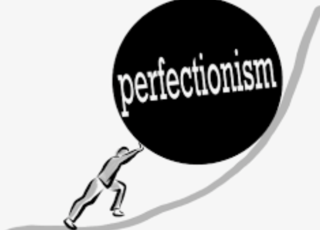Perfectionism
A Look at the Consequences of Perfectionism
The pursuit of being perfect upsets the harmony of being human
Posted April 12, 2021 Reviewed by Hara Estroff Marano
Key points
- The closest thing to perfection is being present, but the perfectionist is never present.
- Perfectionism is just a construct of the mind with no basis in reality.
- Those beleaguered by the need to be perfect usually absorbed early-life messages that they wereen't good enough.
- Perfectionism is a mask for insecurity.

The desire to be perfect traps and burdens many people and imprisons them with unrelenting stress, often creating havoc in their lives. This is a very curious thing, given that the same people believe that seeking perfection is desirable. Like many operating beliefs and assumptions, when we take a deeper look, they may appear nonsensical.
Perfection suggests a state of flawlessness, without any defects. To be perfect implies a condition whereby your action or performance attains a level of excellence that cannot be exceeded. Seeking perfection at a particular task might be achievable, and certainly a student can strive to attain a perfect grade, or you can try to accomplish a perfect execution of something. You can hope to bowl 300 or produce a perfect report at work. You certainly hope your surgeon does a perfect job on your operation.
Yet, the goal of being perfect in life is altogether a different story. A machine or electronic device may operate perfectly—at least for a while. Yet, over time it will begin to wear down and require repair. Humans, however, were never intended to be perfect. That’s part of the definition of being human. Consider the expression, “I’m just human.”
In our culture, we move relentlessly toward greater emphasis on achievement, productivity and goal attainment. We tend to measure our lives in terms of success and achievement and lose perspective on what it may mean to live well. This tendency ruptures any sense of meaning or balance in our lives. We seem to lose the capacity for wonder and awe.
Could you imagine looking at a magnificent rainbow and complaining that the width of one color was narrower than another? Not only would that be ridiculous, we’d also be ruining the splendor of the moment. And yet that is exactly what we do when we judge ourselves for our imperfections.
In truth, the notions of perfect or imperfect are simply constructs of mind and have no actual basis other than thought has created them. The notion of perfection has existed since ancient Greece, but in its more modern incarnation, it is a construct of Newton’s mechanics. It has no place, however, in a participatory worldview.
Ironically, if someone ever could achieve the implausible state of perfection, it’s likely that very few people would tolerate him or her. For the perfect individual would be a constant reminder to all others of their own shortcomings. Not to mention that they probably wouldn’t be much fun to be with. Who would really tolerate, let alone enjoy, being with someone who was inhumanely perfect?
When I speak on the subject—the problem with perfectionism—people often protest that they are simply striving for excellence and may ask what is wrong with trying to improve. My response is, there’s no problem with that at all, if it’s done with balance. But must you always be striving to improve? If so, you are forever climbing the ladder reaching to the rung above you. You never reach your goal, there are always more rungs. So you’ll be happy when?
The paradox here is that to perpetually strive suggests that you may not be at peace, and that actually impedes your forward progress. In other words, the balance that is derived from pausing from the inexorable improvement permits intuitive growth. When we experience being present in the moment, our personal evolution may vault forward. However, if we are ceaselessly pushing ourselves forward, we may actually impinge the very progress we seek. To be the “best you can be,” requires that you free yourself from being the subject of your onerous demands.
A mask for insecurity
I have often counseled people who were beleaguered by their need to be perfect. I have come to learn that their pursuit of perfection is really a disguise for insecurity. It becomes a statement that I’m not good enough just as I am. When we do that, we judge ourselves.
Usually we strive toward being perfect to compensate for a sense of inadequacy. People who want to be perfect usually have an exaggerated sense of their own shortcomings. They typically received messages earlier in life that they weren’t good enough. So they decided that only by being perfect would they be beyond reproach.
With such an affliction we might look at perfectionism as a compensation for earlier life experiences –wave collapses—that corrupted someone’s well-being and self-esteem. As a compensatory response, the drive toward perfection is erroneously sought as a solution. Perfectionists tend to think that other people are somehow better or superior to them, so they need to be without flaw just to catch up. This is a terribly damaging myth.
Individuals who seek perfection are more sensitive to the judgments of others. In fact, these judgments are most often imagined. Everyone has an opinion, but elevating someone else’s opinion to the status of being a judgment is really silly. After all, someone else can’t really judge you unless you confer upon him or her, the power of being a judge.
The only perfection is in being present, yet the perfectionist is never present
The closest thing to perfection is in the ability to be fully present. Without any distracting thoughts measuring or grading ourselves, we’re free to really be in the moment. It’s in that moment that we’re truly alive. Yet, the perfectionist isn’t typically present, as they’re either busy critiquing the past and replaying their every decision or worrying about their future decisions. So, you see, the perfectionist is never really present. Isn’t that ironic?
The pursuit of perfection limits our ability to be present and literally robs us of the vitality of life. It is unachievable, unimaginable and frankly undesirable, so why pursue it? Your time would be far better spent in delving into how to transcend the insecurity that catalyzed the desire for perfection in the first place.
For more, listen to Mel's recent podcast, The Problem with Perfection




